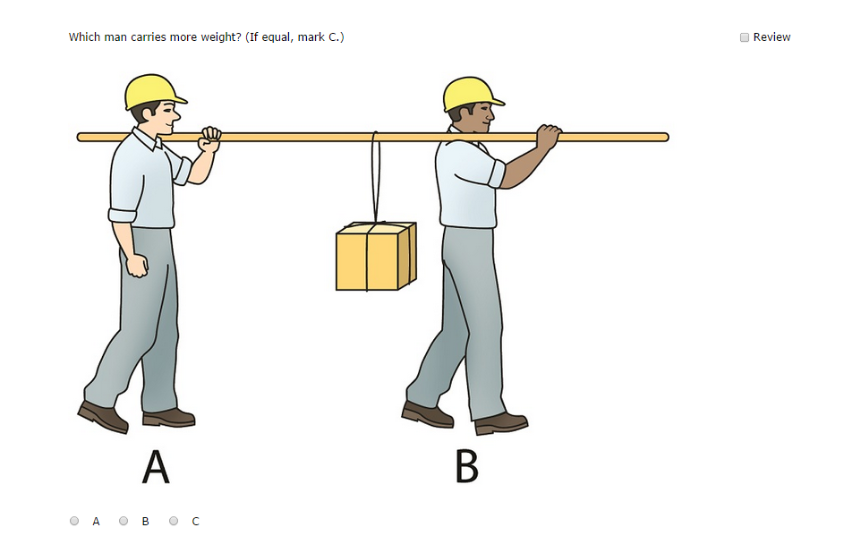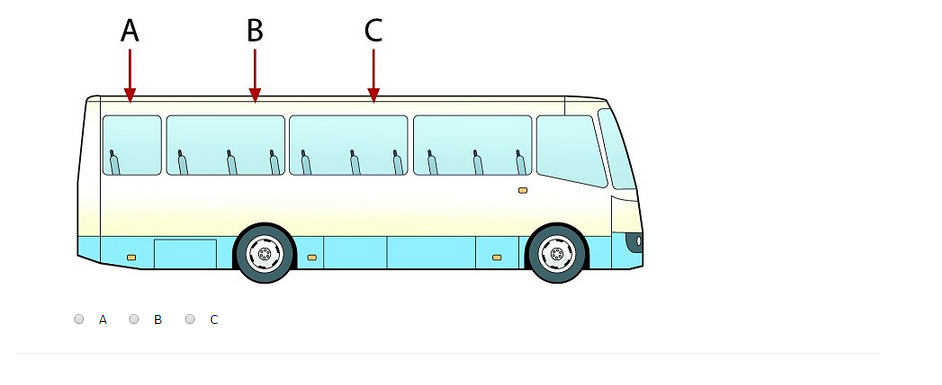Bennett Mechanical Comprehension Tests (2026 Study Guide)
All products and services featured are independently selected by WikiJob. When you register or purchase through links on this page, we may earn a commission.
- What Is the Bennett Mechanical Comprehension Test?
- How Reliable Is the Bennett Mechanical Comprehension Test?
- Where and Why You Might Take Bennett Mechanical Comprehension Test
empty
- How to Pass the Bennett Mechanical Comprehension Test in 2026
- How Does the BMCT Test Scoring Work?
- Tips and Preparation Strategies for Your Bennett Mechanical Comprehension Test
empty
empty
empty
empty
empty
empty
empty
empty
empty
empty
- Technical Facts
empty
empty
- Examples of Questions You Might Face for Bennett Mechanical Comprehension Test in (2026)
empty
empty
empty
empty
empty
- Why Is Preparation Important for Bennett Mechanical Comprehension Test?
- BMCT Frequently Asked Questions
- Final Thoughts
The Bennett Mechanical Comprehension Test (BMCT), also referred to as the Bennett Mechanical Aptitude Test, is considered the most popular mechanical aptitude test.
However, it is also believed to be the hardest one to pass.
The Bennett test (aka Bennett aptitude test) can help candidates showcase their spatial perception skills and mechanical reasoning abilities, and it is used to identify the best candidates for mechanical, repair and industrial occupations.
Passing the Bennett test may be the deciding factor in being hired, while scoring high on this test will show your future employers that hiring you is a great business move.
What Is the Bennett Mechanical Comprehension Test?
The Bennett Mechanical Comprehension Test (BMCT) is an aptitude test relating to mechanics which has been developed by Pearson. It is used by many employers and schools as an indicator of aptitude for understanding and solving basic mechanical problems.
These are principles that are important in numerous career paths, so when an individual scores highly on this test it is a good indicator that they might excel in a vocation that makes use of their mechanical abilities.
The Bennett Mechanical Comprehension Test is made up of a total of 55 questions/12 categories. There are actually two forms of the test: Form S and Form T.
These forms were developed by updating earlier versions and increasing the difficulty range of the questions.
Form S and T are comparable; both contain 55 items, covering 12 categories relating to mechanical comprehension. When you take the Bennett mechanical test, you will have 30 minutes to complete it, meaning, on average, each of the problems presented will need to be solved within 30 seconds to complete the entire test in the allotted time. So speed is key.
The concepts the test covers are not so advanced that you would need a college education to manage them – truth be told, it's at a sixth-grade level. The test doesn't aim to assess candidates based on their level of education and experience; rather, the Bennett test aims to identify a level of natural or instinctive mechanical thinking.
How Reliable Is the Bennett Mechanical Comprehension Test?
Like any aptitude test relating to mechanics, every correct answer you submit counts towards your overall profile. But these scores in and of themselves are quite useless if they aren't interpreted appropriately, and the Bennett test is known for its accuracy in defining parameters for evaluating aptitude.
It is not only the testing industry that recognizes this – psychologists and recruiters actually give substantial weight to BMCT results and trust the predictions it makes about an individual's potential. For jobs that require a range of aptitudes, the BMCT is most appropriately used in combination with other tests that cover the other skills.
The BMCT is a test that has been used for more than 50 years, which is a testament to its versatility and usefulness.

Practice Bennett Test with JobTestPrep
Where and Why You Might Take Bennett Mechanical Comprehension Test
There are many reasons why a person might need to take the BMCT, the most common being as part of an assessment process for businesses or organizations looking to hire people into roles needing mechanical proficiency.
The Bennett test of mechanical comprehension can function as a screening process to rule out candidates who don't possess the natural aptitude in mechanics to succeed. It can also be used to identify weaknesses in employees so that they can be given training to enhance their skills in specific areas.
List of Jobs That Require the BMCT
The Bennett mechanical test seeks to ascertain whether the candidate has a concept of the basic function of tools, has a good level of spatial perception, and possesses the ability to swiftly comprehend and apply basic mechanical concepts.
The job roles where you might expect to take a BMCT include:
- Auto mechanics
- Carpenters
- Electricians
- Engineers
- Equipment operators
- Plumbers
- Truck drivers
The test seeks to ascertain whether the candidate has a concept of the basic function of tools, has a good level of spatial perception, and possesses the ability to swiftly comprehend and apply basic mechanical concepts. If you are preparing to take the BMCT for a role in a specific industry, there's a good chance you'll be taking a version of it that is specifically tailored toward that field.
There are many prominent companies that are known to utilize the BMCT either for recruitment screening or evaluation purposes.
Here are some of the most notable ones:
- Delta Airlines – for its mechanics
- Nestle – for its electricians, maintenance technicians and machine operators
- Union Gas – for its service representatives
- Coca-Cola – for its maintenance mechanics
- Culver Careers – for its technicians and sales teams
It's important to note that while the test might be a component of the recruitment process, employers will probably also require you to take other assessments, attend interviews, and participate in group exercises.
How to Pass the Bennett Mechanical Comprehension Test in 2026
It's vital that you familiarize yourself with a few core concepts of physics before taking the bmct test. For example:
- To push the roller over a step, one must exert a more significant force than required to pull the roller over the level.
- A body's inertia is its inability to change its own state of rest or uniform motion.
- The forces that act on a single point are concurrent, and if the resultant force is zero then they are in equilibrium.
- A person on a surface that has zero friction can propel himself by blowing air out through the mouth or by throwing an object in the opposite direction to the one he wants to move.
- To produce extension or compression in a spring, you will have to apply two opposite, equal forces to it. The equilibrium-restoring force that is developed, due to the spring's elasticity, is opposite to the applied force and equal to either force. A definitive amount of work must be done against the restoring force when compressing the spring. This work is stored as potential energy in the spring.
Watch this video from JobTestPrep for some insights into mechanical tests and tips on how to improve your score.
How Does the BMCT Test Scoring Work?
The Bennett Mechanical Comprehension Test (BMCT) is scored based on the number of correctly answered questions.
The test consists of multiple-choice questions, and each question has four answer options.
Here's how the scoring generally works for the BMCT:
-
Raw Score: The raw score is the total number of questions answered correctly. Each correct answer contributes to your raw score.
-
Scaled Score: The raw score is then converted into a scaled score. The scaled score is derived by taking into account the difficulty level of the questions and the performance of a reference group. The scaled score allows for fair comparison of scores across different versions of the test.
-
Percentile Rank: The percentile rank indicates the percentage of test-takers who scored below you. For example, if your percentile rank is 75, it means you scored higher than 75% of the reference group. The percentile rank provides a relative ranking of your performance compared to others who have taken the test.
-
Norms and Comparison: The BMCT scores are typically compared to a norm group, which consists of individuals who have previously taken the test. The norms provide a benchmark to evaluate and compare your performance.
0–19: For almost all applications, this would not be a pass. Although you might demonstrate some understanding of mechanical reasoning, you would need very close supervision and extra training.
20–39: This percentile range might make you a candidate if you also scored highly on other parts of the application, as you have demonstrated a basic ability to use mechanical reasoning to solve problems.
40–59: This is likely to be considered a hiring range for many roles. You would learn at a steady pace and demonstrate good aptitude for applying mechanical principles.
60–79: For more technical roles this would be considered a great score, and hiring managers would be confident of your affinity with mechanical principles.
80+: At this range, you demonstrate a strong grasp of mechanical principles and excellent spatial awareness. This percentile range is a very good score for even the most technical roles.
If you need to prepare for a number of different employment tests and want to outsmart the competition, choose a Premium Membership from JobTestPrep.
You will get access to three PrepPacks of your choice, from a database that covers all the major test providers and employers and tailored profession packs.
Tips and Preparation Strategies for Your Bennett Mechanical Comprehension Test
If you are going to take the Bennett Mechanical Comprehension Test, it is important that you prepare sufficiently. This is essential if you want to finish with the best possible score and pass through to the next stage in the screening process.
Even if you have a good knowledge of many of the principles associated with mechanics, it is helpful to understand how the test works. This will help you work through the questions at a faster rate: key when you only have half a minute per question.
There are some good resources online to help you prepare for the BMCT. For example, if you head over to Personality and Aptitude Career Tests you will find some free practice resources to help you get a feel for what is expected.
If you're willing to put down a bit of money to prepare yourself, JobTestPrep has an excellent mechanical test practice package.
Read the Question
The questions are usually not complicated, so take some time to read them thoroughly and it will help you to understand how best to answer.
Use the Graphics
Each question is accompanied with a graphic or image that demonstrates the mechanical law that is being assessed. The answer is in the image – you just need to apply the correct mechanical reasoning.
Practice
It might seem obvious, but the best way to prepare and succeed in a mechanical reasoning test is to practice. Pearson has stated that those who practice regularly can increase their score by 4 points on average – and while that might not seem like much, it could be the difference between a pass and a fail.
Be Quick
With 55 questions to answer in just 25 minutes, there is not a lot of time to spend on each one. This means that you need to be able to answer quickly as well as accurately to be successful.
Use Your Knowledge
Unlike some other types of aptitude tests that require you to use only the information in front of you, the Bennett Mechanical Comprehension Test makes use of your prior knowledge and also your competence at physics and mechanics.
Work on Your Test-Taking Skills
Practice with iPrep so you can improve your skills and answer more questions correctly within the time limit. Practicing in advance will not only help you do better in a shorter amount of time, but help you feel more confident on test day.
Never Leave a Question Unanswered
Each question in the Bennett test has three optional answers. One of these has to be the correct answer. That means you have a 33% chance to guess correctly even if you have no idea.
If you are able to eliminate one of the answers, you increase your odds of being right to 50%. That’s a lot. If you leave a question unanswered, your chances of getting it right drop to 0%!
Since there is no penalty for wrong answers, the only reasonable thing to do is to answer each and every question, even if this means guessing or rushing through the last questions of the test.
Watch Your Time
Pay attention to the clock because a timed test has a limit. Don’t get too caught up on any one question. Taking timed practice tests will prepare you for the pressures of test day, and help you get used to answering quickly.
Rest
Get a good night’s sleep and eat breakfast Resting well will help you concentrate on test day. Make sure you have already used the restroom and are ready to go when you start the test.
Eat a well-balanced meal before taking the test so you don’t get distracted.
Don’t Forget Your Photo ID
If you arrive at the testing center without a photo ID, you will not be allowed to take the test. Double check that you have it before you leave the house.
Technical Facts
While the official name of the test is the Bennett Mechanical Comprehension Test II, the test has many unofficial names, including:
- Bennett Mechanical Comprehension Test
- Bennett Mechanical Aptitude Test
- Bennett Test
- Bennett Mechanical Test
- BMCT
- BMCT Test
- Pearson Bennett Mechanical Comprehension Test
- Bennett Mechanical Test Common Names of the Test
Jobs and Positions That Require Passing the Bennett Mechanical Test
Many organizations and companies utilize the
Bennett Mechanical Comprehension Test for screening purposes. If you pass the test, you will open yourself up to the following:
A fulfilling career in a company such as Coca-Cola, Delta Airlines, Nestle or Dupont.
A job in the following areas:
- Group Occupations
- Installation/Maintenance/Repair Facility maintenance, HVAC technician, equipment installation technician
- Skilled Trades Electrician, welder, plumber, carpenter
- Machine Operator/Machinist Machine operator, machinist
- General Labor Laborer, material mover/handler, groundskeeper
- Vocational/Technical Student Student in a vocational/technical program requiring mechanical comprehension
- Mechanic Automotive, motorcycle, diesel, aircraft
- Engineer Mechanical, electrical, civil, aerospace
- Industrial/Technical Sales Industrial product sales, technical product sales
Level of Difficulty
On the Bennett Mechanical Comprehension Test II, each question is assigned a level of difficulty, ranging from simple to very difficult.
Each test has a set number of questions at each difficulty level, ensuring that every candidate who takes the test faces the same number of simple, difficult, and very difficult questions.
This allows administrators to compare scores despite the fact that each test uses different questions pulled from the question bank. All the while, all test takers still take the same number of questions per subject.
Examples of Questions You Might Face for Bennett Mechanical Comprehension Test in (2026)
Most questions in a mechanical aptitude test will involve a problem relating to an image.
The following are a couple of bennett test examples of what to expect, to help you familiarize yourself with how the questions work.
Example 1
Question: Which man carries more weight? If equal, mark C.
The question is asking you to choose which spot will be the least bumpy during the ride.
This question follows a similar format, presenting the tested individual with a simple diagram and a question relating to a mechanical concept. As you will have noticed, the questions are multiple-choice, so there is rarely need for any complex calculations to find the correct answer.
Within the Bennett Mechanical Comprehension Test, there are several sub-categories of mechanical concepts you’ll be asked questions on.
The most frequently asked topics include Velocity, Fluids, Forces, and Torque. Together, they account for two-thirds of the test content, so the next three examples relate to these.
Example 3: Velocity
With velocity questions, which account for 28% of the Bennett Mechanical Comprehension Test, employers are seeking to understand how much you know about the basic rule of physics.
Largely, the questions are centered on gravity, acceleration, and Newton’s law of physics.
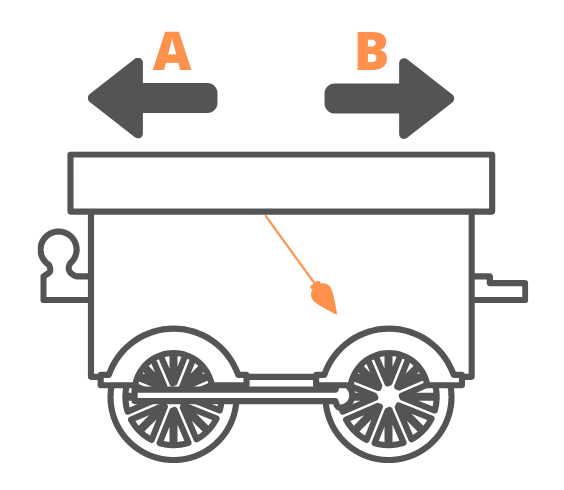
Determine which way the train wagon is accelerating. As with the example questions above, you can select A or B (or C if both could be the correct answer).
For these types of questions, of which there are plenty, it may be worth familiarising yourself with the rules on accelerating systems.
It’s all related to gravity – if you’re on a rollercoaster, for example, you’ll be traveling forwards but will feel yourself being dragged backward during acceleration and when the ride jolts to a stop.
Example 4: Fluid Mechanics
As you’d expect, fluid mechanic questions deal with everything to do with how fluids, liquids and gas respond to a certain activity.
For example, if the water pressure is higher, will the load sink or float? Will gas expand or contract when the temperature rises? All of these types of questions can appear in this section of the Bennett Mechanical Comprehension Test.
So, here’s an example below:
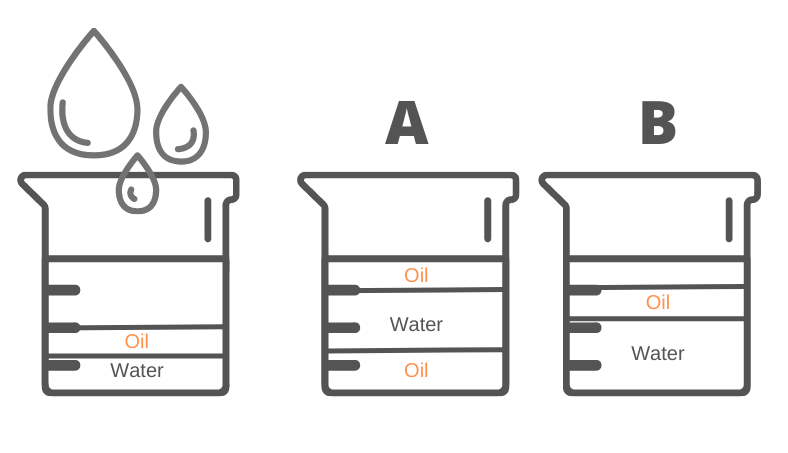
A glass cup already holds oil and water (the picture on the left). If you were to add more water to the cup, what would happen to the water and oil? Please choose either A or B (or if both or neither apply, pick C).
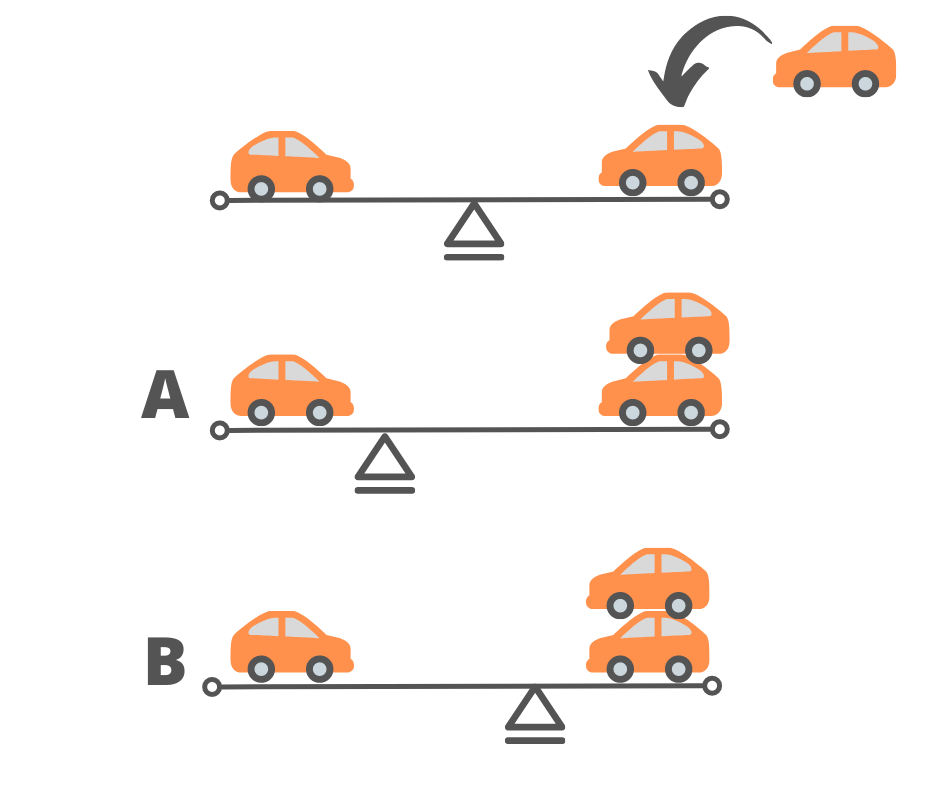
Looking at the seesaw in the top picture, it is balanced with one car on either side of the same weight. However, if you were to add another car and place it on top of the right-hand car, where would you need to move the triangle (fulcrum) to re-balance the seesaw?
Why Is Preparation Important for Bennett Mechanical Comprehension Test?
Having an understanding of mechanical principles and getting a high score on the Bennett mechanical test doesn't necessarily go hand-in-hand. The format of the test might distract you if you haven't done any preparation, or you may simply wade through the questions too slowly to achieve a high score at the end.
Work on some bennett mechanical test practice questions and you will find yourself far more relaxed and confident when it comes to sitting in a room and taking the real test.
Anyone with aspirations to work in a mechanical field, no matter what it may be, should familiarize themselves with the BMCT. Given its popularity and strong record for reliability, the test will play a role in hiring and evaluation processes for many years to come.
BMCT Frequently Asked Questions
The Bennett test is an aptitude assessment. It is used by employers and educational establishments to test aptitude for understanding and solving mechanical problems.
You might be asked to take it as a prospective student, job applicant or employee.
It is especially relevant for career paths like carpentry, engineering and plumbing.
Upon completion of the BMCT, the hiring organization will receive your score report. This will include a competence (theta) score and a percentage score, which is derived from the competence score.
What constitutes a good score will depend on the profession, with some job roles requiring a higher score than others.
A percentile ranking is used to compare test results against others within a norm group. A percentile ranking score above 40 is considered to be within the ‘good’ range for many job roles.
The BMCT contains 55 questions across 12 different categories. Candidates have 25 minutes to answer all questions in the test.
There are many online resources available to help you improve your mechanical aptitude. Online instructional videos are a good option for visual learners who wish to learn mechanical concepts and skills.
Depending on your budget, you may wish to enlist the help of a dedicated mentor with relevant experience or take a structured course in mechanical concepts.
JobTestPrep offers a comprehensive Bennett test study guide with tailored mechanical aptitude practice materials.
The Bennett test is scored using a competence (theta) score and a percentage score, which is worked out using the competence score. A percentile ranking is used to compare competence score results against other test-takers within a norm group. The required pass rate will depend on the job role you are applying for.
Here are some examples of jobs and positions that may require passing the Bennett Mechanical Test:
- Mechanical Engineers
- Technicians
- Manufacturing and Production Workers
- Aviation and Aerospace Technicians
- Tradespeople
- Military and Defense Jobs
Here are some possible next steps:
The first step is usually the evaluation of your BMCT scores. Employers or institutions will review your test results to determine whether you meet the minimum requirements for the position or program you're applying for.
If you achieve a satisfactory score on the BMCT, you may be invited to participate in an interview or further assessment.
In some cases, employers may require candidates to undergo hands-on skill assessments or practical tests to verify their mechanical aptitude.
Depending on the nature of the position, employers may conduct background checks and contact your references to gather additional information about your qualifications and character.
After evaluating all aspects of your application, including your BMCT scores, interview performance, and any additional assessments, the employer or institution will make a decision regarding your candidacy.
If you are successful, you may receive a job offer or be admitted into a program or training course. At this point, you can negotiate terms and conditions, such as salary, benefits and start date.
There are some differences between the BMCT-II tests and the now-retired BMCT. The former is the newer version and is the only one still in use. The BMCT-II contains 55 questions and takes 25 minutes to complete, while the earlier BMCT contained 68 questions and took 30 minutes to complete.
Also, the old BMCT contained 18 categories of mechanical questions while the BMCT II contains only 12 categories (see table above).
Final Thoughts
The Bennett Mechanical Comprehension Test is an established and recognized way for employers to evaluate and screen candidates for mechanical comprehension. The test is intended to reveal a person's innate aptitude rather than what they have been trained in.
To give yourself the best possible chance of success, familiarize yourself as much as possible with the format of bennett mechanical aptitude test and the types of questions you will encounter.
To give yourself the best possible chance of success, familiarize yourself as much as possible with the format of the test and the types of questions you will encounter.


